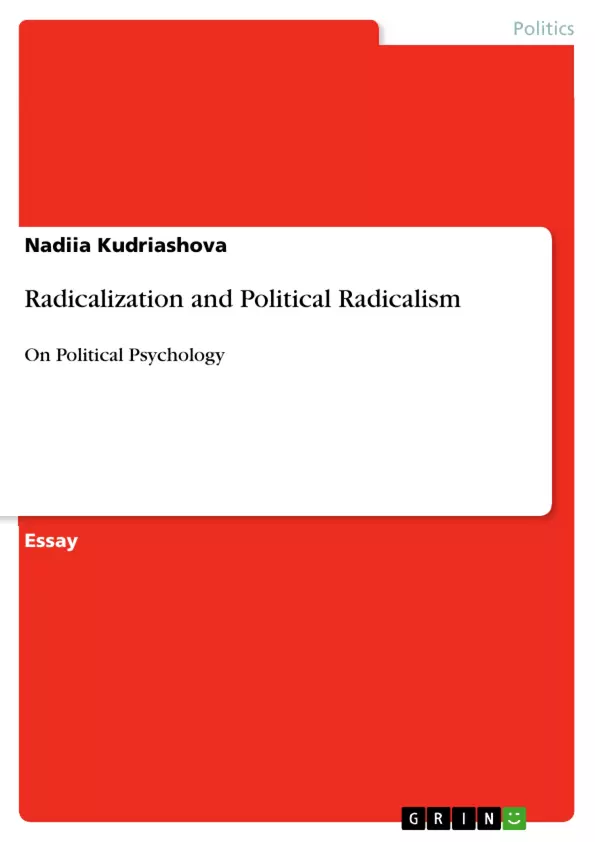The present work focuses on radicalization and political radicalism. In modern conditions, political radicalism is an integral component of the political life of many countries, manifested in the activities, value orientations of the ruling and opposition elites, as well as ordinary citizens. Being a multifaceted phenomenon, in the era of globalization, it is transformed and modified, assumes various types and forms adequate to new civilizational challenges and risks. Historical and modern events eloquently testify that radical methods of solving socio-political problems, especially those that are actualizing in the conditions of crises, are often used by the authorities even during periods of stable development.
In the situation of the current economic crisis, which became structural and went beyond the economic sphere, the radial moods of the actors in the political process, as well as the activities of various radical and extremist organizations, became much more active. Political extremism and radicalism, as its variety, are among the most ambiguous and multifaceted problems of modern political science. In recent years, researchers have been actively investigating the causes, essence, and content of this phenomenon.
Modern political realities necessitate the analysis of manifestations of radicalism burdened with negative meanings. In this context, it is necessary to analyze the concepts of "radicalism" and "extremism," reveal their similarities and differences. The similarity consists in rejecting compromises, demanding a radical reorganization of existing social and political institutions, and as soon as possible. The difference between these concepts is relative, conditional. Radicalism, as a phenomenon, is more a kind of political ideology, justifying radical actions. Extremism is a concept that characterizes mainly political practice.
Table of Contents
- Radicalization
Objectives and Key Themes
The objective of this text is to explore the multifaceted nature of political radicalism in the context of globalization and modern socio-political crises. It examines the causes, essence, and various forms of radicalism, including its relationship with extremism and terrorism. The text also delves into the psychological aspects of extremism and the different types of radicalism, such as constructive and destructive.
- The definition and various interpretations of radicalism and extremism.
- The psychological factors contributing to extremism and radical behavior.
- The different types and manifestations of radicalism (constructive vs. destructive).
- The role of socio-political crises in fostering radical movements.
- The connection between radicalism, terrorism, and violence.
Chapter Summaries
Radicalization: This chapter provides a broad overview of political radicalism as a complex phenomenon within the context of modern political life. It highlights the increased activity of radical and extremist organizations during economic crises, emphasizing the ambiguity and multifaceted nature of this subject. The chapter delves into the insufficient scholarly attention given to concepts like "radicalism," "extremism," and "terrorism," underscoring the need for more extensive research. It introduces the core concept of radicalism as intensified commitment to extreme views, often used synonymously with extremism, and touches upon the psychology of extremism, describing the extremist's self-perception as a messianic figure justified in using extreme means to achieve political goals. The chapter explores preconditions for extremism, like ideology and practice within the political sphere and the influence on governmental decision-making, establishing the relationship between political extremism and terrorism. It concludes by highlighting the various socio-economic and political factors engendering extremism, emphasizing the role of crises, institutional deformation, and social unrest in fostering radical attitudes.
Keywords
Political radicalism, extremism, terrorism, political psychology, socio-economic crises, globalization, constructive radicalism, destructive radicalism, ideology, violence, fundamentalism, revolutionism, social unrest.
Frequently Asked Questions: A Comprehensive Language Preview on Political Radicalism
What is the main objective of this text?
The text aims to explore the multifaceted nature of political radicalism within the context of globalization and modern socio-political crises. It investigates the causes, essence, and various forms of radicalism, including its relationship with extremism and terrorism, and delves into the psychological aspects of extremism, differentiating between constructive and destructive radicalism.
What are the key themes explored in this text?
Key themes include the definition and interpretations of radicalism and extremism; the psychological factors contributing to extremism and radical behavior; the different types and manifestations of radicalism (constructive vs. destructive); the role of socio-political crises in fostering radical movements; and the connection between radicalism, terrorism, and violence.
What does the chapter on "Radicalization" cover?
The chapter provides a broad overview of political radicalism as a complex phenomenon in modern political life. It highlights the increased activity of radical and extremist organizations during economic crises, addresses the insufficient scholarly attention given to concepts like "radicalism," "extremism," and "terrorism," and explores the psychology of extremism, including the extremist's self-perception. The chapter also examines preconditions for extremism, the relationship between political extremism and terrorism, and the various socio-economic and political factors that contribute to extremism.
What are the key terms or keywords associated with this text?
Key terms include political radicalism, extremism, terrorism, political psychology, socio-economic crises, globalization, constructive radicalism, destructive radicalism, ideology, violence, fundamentalism, revolutionism, and social unrest.
What types of radicalism are discussed?
The text distinguishes between constructive and destructive radicalism, examining the different manifestations and impacts of each.
What is the role of socio-political crises in the context of radicalism?
The text emphasizes the significant role of socio-political crises, including economic crises, institutional deformation, and social unrest, in fostering radical attitudes and movements.
What is the relationship between radicalism, extremism, and terrorism explored in this text?
The text explores the complex relationship between these three concepts, highlighting their interconnectedness and the nuances in their definitions and manifestations.
What is the significance of the psychological aspects of extremism?
The text delves into the psychological factors that contribute to extremist behavior, including the self-perception of extremists and the underlying motivations for their actions.
- Quote paper
- Nadiia Kudriashova (Author), 2018, Radicalization and Political Radicalism, Munich, GRIN Verlag, https://www.grin.com/document/457908



